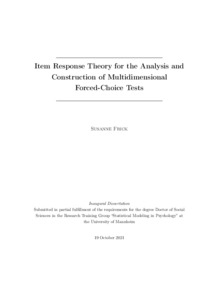|
Item response theory for the analysis and construction of multidimensional forced-choice tests
Frick, Susanne
![[img]](https://madoc.bib.uni-mannheim.de/61151/1.hassmallThumbnailVersion/FrickSusanne_Dissertation_Druckversion.pdf)  Vorschau |
|
PDF
FrickSusanne_Dissertation_Druckversion.pdf
- Veröffentlichte Version
Download (2MB)
|
|
URL:
|
https://madoc.bib.uni-mannheim.de/61151
|
|
URN:
|
urn:nbn:de:bsz:180-madoc-611519
|
|
Dokumenttyp:
|
Dissertation
|
|
Erscheinungsjahr:
|
2021
|
|
Ort der Veröffentlichung:
|
Mannheim
|
|
Hochschule:
|
Universität Mannheim
|
|
Gutachter:
|
Erdfelder, Edgar
|
|
Datum der mündl. Prüfung:
|
9 Dezember 2021
|
|
Sprache der Veröffentlichung:
|
Englisch
|
|
Einrichtung:
|
Außerfakultäre Einrichtungen > Graduiertenkolleg "Statistical Modeling in Psychology" (SMiP)
Fakultät für Sozialwissenschaften > Psychologische Methodenlehre u. Diagnostik (Meiser 2009-)
|
|
Lizenz:
|
 Creative Commons Namensnennung 4.0 International (CC BY 4.0)
Creative Commons Namensnennung 4.0 International (CC BY 4.0)
|
|
Fachgebiet:
|
150 Psychologie
|
|
Freie Schlagwörter (Englisch):
|
multidimensional forced-choice , item response theory , Thurstonian IRT model , psychometrics
|
|
Abstract:
|
The multidimensional forced-choice (MFC) format has been proposed as an alternative to rating scales. In the MFC format, respondents indicate their relative preference for items measuring different attributes within blocks. Test construction for the MFC format is complex because how the items are combined affects the properties of the test. The aim of this thesis was to investigate and further develop IRT methods for the MFC format that can help to improve MFC test construction, focusing on the Thurstonian IRT model and a ranking instruction.
In the first manuscript (Frick et al., 2021), we conducted an extensive simulation study on the normativity of Thurstonian IRT trait estimates. We investigated realistic test designs, removed a potential confounding with item parameter bias and compared recovery to that from classical test theory scoring and from rating scale and true-false formats. We found that with all positively keyed items, trait estimates showed ipsative properties.
However, with mixed item keys, they were insensitive to otherwise suboptimal test designs. In an empirical study, we found that construct validity in the MFC format with three-item blocks was lower and criterion validity equal to the true-false format.
In the second manuscript (Frick, 2021b), I developed the Faking Mixture model, a model for faking in the MFC format that allows to estimate the fakability of individual MFC blocks. A simulation study showed good parameter recovery. An empirical validation showed that the model can capture expected differences in item desirability, but also that matched blocks were not fully fake-proof. Therefore, it is worth to apply the Faking Mixture model in order to reduce fakability by removing or modifying blocks during test
construction.
In the third manuscript (Frick, 2021a), I proposed methods to estimate and summarize Fisher information for Thurstonian IRT models on the block level. Three simulation studies showed that the methods can accurately recover true information and are useful for test
construction. It was examined how the proposed information summaries can be combined with algorithms for automated test assembly. Thus, block information can be used to
assemble MFC tests that maximize reliability and have an ideal test design.
In summary, this thesis provided both new methods and guidelines for MFC test construction. Modeling the block level did and will help to adequately capture the relative
response process and item interactions and it can provide avenues for further psychometric developments.
|
 | Dieser Eintrag ist Teil der Universitätsbibliographie. |
 | Das Dokument wird vom Publikationsserver der Universitätsbibliothek Mannheim bereitgestellt. |
 Suche Autoren in Suche Autoren in
Sie haben einen Fehler gefunden? Teilen Sie uns Ihren Korrekturwunsch bitte hier mit: E-Mail
Actions (login required)
 |
Eintrag anzeigen |
|
|
